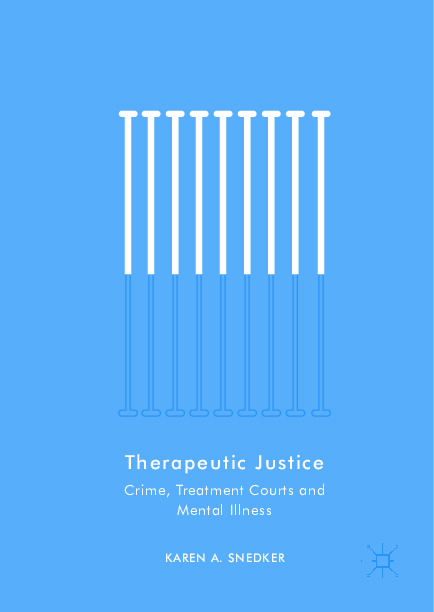File #2347: "2018_Book_TherapeuticJustice.pdf"
Text
1|Preface|7
1|Acknowledgements|10
1|Contents|15
1|List of Figures|17
1|List of Tables|18
1|1 Mental Health Courts as the “New Generation” of Problem-Solving Courts|19
2|Shifting Punitive Penal Practices|22
2|Problem-Solving Courts|25
2|Mental Illness and Criminality|26
2|The Advent of Mental Health Courts|30
2|Case Study Research Design|34
2|Book Outline|38
2|References|41
1|2 Beyond Adversarialism?: Collaboration and Therapeutic Goals|46
2|Therapeutic Justice|47
2|Mission|48
3|Mental Illness and Criminal Behavior|51
2|Paradigm Shift|54
3|Therapeutic Jurisprudence|54
3|Collaboration and Reduced Adversarialism|56
2|Court Organization and Cultural Practices|61
3|Competency|65
3|Goals and Values of Therapeutic Justice|69
4|Stigma Remains in MHC|72
2|Criticism of MHCs: Net Widening|74
3|Wider Nets|75
3|Stronger Nets|77
3|New Nets|83
2|“Nets” Revisited|86
2|Mission Alignment|88
2|References|94
1|3 Clients and Therapeutic Agents: Court Selection and Team Dynamics|99
2|Entry into MHC|99
3|Stages of Selection|101
4|Selection Process: Bias and Underrepresentation|109
3|Client Participation in MHC|113
3|“MHC Lite”: Both In and Out of MHC|119
2|Therapeutic Agents and the MHC Team|123
3|Judges|124
4|“Buy-In”|124
4|Demeanor and Temperament|127
4|Team Players|129
4|Judicial Consistency|131
2|Lawyers|132
2|Probation Officers|134
2|Other Therapeutic Team Members|136
2|Assessing the Therapeutic Team|138
2|References|142
1|4 Therapeutic Justice in Action: Court Process, Reviews and Sanctions|146
2|Procedural Justice in the Court Process|147
3|Shifts in Organization and Court Practices|151
3|Client Anxiety|152
2|Reviews: Accountability, Compliance and Sanctions|155
2|The Sanctioning Process|159
3|Integrating Elements of a Graduated Sanctions Model|160
3|Harm Reduction Insights in MHCs|163
3|Individualized Harm Reduction|169
3|Positive Sanctions|173
3|Negative Sanctions|177
4|Jail as a “Last Resort”|188
2|Widening Discretion|192
2|References|195
1|5 Reducing Recidivism and Pathways to Success|198
2|Criminal Recidivism: Incentives, Mental Health Treatment and Graduation|200
3|Incentives|201
4|Beyond the Offer to Dismiss Charges|203
4|Expanding Court Program Incentives|206
3|Mental Health Treatment|209
3|Graduation|213
3|Structure and Social Support|219
2|Liminal Stage|225
2|Broadening the Idea of Success|226
3|Success Within Limits|230
3|“Frequent Flyers”|233
3|Worst-Case Scenarios|234
2|References|238
1|6 Stories from Clients: How Mental Health Courts Can Change Lives|243
2|“It Has Ruined My Taste for Alcohol”: Sobriety, Incentives and Social Support|244
2|“It’s a Way to Build Healthy Habits”: Sobriety, Treatment and Identity|248
2|“It Helped Humble Me Down”: Faith, Support, and Tools for Living|253
2|“Just Keeping My Nose Clean”: Staying Sober, Compliance and Supportive Housing|257
2|“I Don’t Have to Keep Going Back to Bad Situations”: Trauma, Trust and Responsibility|261
2|“Meth Has Been My Downfall. It Destroyed My Life”: Drugs, Jail and Structure|265
2|“It is Not That Big of a Deal”: Mindfulness, Compliance and Education|269
2|Client Success Trajectories|273
2|References|276
1|7 Conclusion: From Therapeutic Justice to Social Work Criminal Justice|277
2|Implementing Reforms for MHCs: Toward Social Work Criminal Justice|279
3|Therapeutic Orientation: Adopting Harm Reduction|281
4|Incentives|281
4|De-Stigmatize|284
4|Diversity|285
3|Collaboration: Management and Education|288
4|Court Management|288
4|Team Member Training and Recruitment|292
4|Collecting, Analyzing and Using Data|293
4|Publicity|294
2|Tradeoffs of “Net-Widening”|296
2|Prevention Prior to MHC|298
2|Final Thoughts|299
2|References|304
1|Appendices|307
1|References|321
1|Index|335
1|Acknowledgements|10
1|Contents|15
1|List of Figures|17
1|List of Tables|18
1|1 Mental Health Courts as the “New Generation” of Problem-Solving Courts|19
2|Shifting Punitive Penal Practices|22
2|Problem-Solving Courts|25
2|Mental Illness and Criminality|26
2|The Advent of Mental Health Courts|30
2|Case Study Research Design|34
2|Book Outline|38
2|References|41
1|2 Beyond Adversarialism?: Collaboration and Therapeutic Goals|46
2|Therapeutic Justice|47
2|Mission|48
3|Mental Illness and Criminal Behavior|51
2|Paradigm Shift|54
3|Therapeutic Jurisprudence|54
3|Collaboration and Reduced Adversarialism|56
2|Court Organization and Cultural Practices|61
3|Competency|65
3|Goals and Values of Therapeutic Justice|69
4|Stigma Remains in MHC|72
2|Criticism of MHCs: Net Widening|74
3|Wider Nets|75
3|Stronger Nets|77
3|New Nets|83
2|“Nets” Revisited|86
2|Mission Alignment|88
2|References|94
1|3 Clients and Therapeutic Agents: Court Selection and Team Dynamics|99
2|Entry into MHC|99
3|Stages of Selection|101
4|Selection Process: Bias and Underrepresentation|109
3|Client Participation in MHC|113
3|“MHC Lite”: Both In and Out of MHC|119
2|Therapeutic Agents and the MHC Team|123
3|Judges|124
4|“Buy-In”|124
4|Demeanor and Temperament|127
4|Team Players|129
4|Judicial Consistency|131
2|Lawyers|132
2|Probation Officers|134
2|Other Therapeutic Team Members|136
2|Assessing the Therapeutic Team|138
2|References|142
1|4 Therapeutic Justice in Action: Court Process, Reviews and Sanctions|146
2|Procedural Justice in the Court Process|147
3|Shifts in Organization and Court Practices|151
3|Client Anxiety|152
2|Reviews: Accountability, Compliance and Sanctions|155
2|The Sanctioning Process|159
3|Integrating Elements of a Graduated Sanctions Model|160
3|Harm Reduction Insights in MHCs|163
3|Individualized Harm Reduction|169
3|Positive Sanctions|173
3|Negative Sanctions|177
4|Jail as a “Last Resort”|188
2|Widening Discretion|192
2|References|195
1|5 Reducing Recidivism and Pathways to Success|198
2|Criminal Recidivism: Incentives, Mental Health Treatment and Graduation|200
3|Incentives|201
4|Beyond the Offer to Dismiss Charges|203
4|Expanding Court Program Incentives|206
3|Mental Health Treatment|209
3|Graduation|213
3|Structure and Social Support|219
2|Liminal Stage|225
2|Broadening the Idea of Success|226
3|Success Within Limits|230
3|“Frequent Flyers”|233
3|Worst-Case Scenarios|234
2|References|238
1|6 Stories from Clients: How Mental Health Courts Can Change Lives|243
2|“It Has Ruined My Taste for Alcohol”: Sobriety, Incentives and Social Support|244
2|“It’s a Way to Build Healthy Habits”: Sobriety, Treatment and Identity|248
2|“It Helped Humble Me Down”: Faith, Support, and Tools for Living|253
2|“Just Keeping My Nose Clean”: Staying Sober, Compliance and Supportive Housing|257
2|“I Don’t Have to Keep Going Back to Bad Situations”: Trauma, Trust and Responsibility|261
2|“Meth Has Been My Downfall. It Destroyed My Life”: Drugs, Jail and Structure|265
2|“It is Not That Big of a Deal”: Mindfulness, Compliance and Education|269
2|Client Success Trajectories|273
2|References|276
1|7 Conclusion: From Therapeutic Justice to Social Work Criminal Justice|277
2|Implementing Reforms for MHCs: Toward Social Work Criminal Justice|279
3|Therapeutic Orientation: Adopting Harm Reduction|281
4|Incentives|281
4|De-Stigmatize|284
4|Diversity|285
3|Collaboration: Management and Education|288
4|Court Management|288
4|Team Member Training and Recruitment|292
4|Collecting, Analyzing and Using Data|293
4|Publicity|294
2|Tradeoffs of “Net-Widening”|296
2|Prevention Prior to MHC|298
2|Final Thoughts|299
2|References|304
1|Appendices|307
1|References|321
1|Index|335

